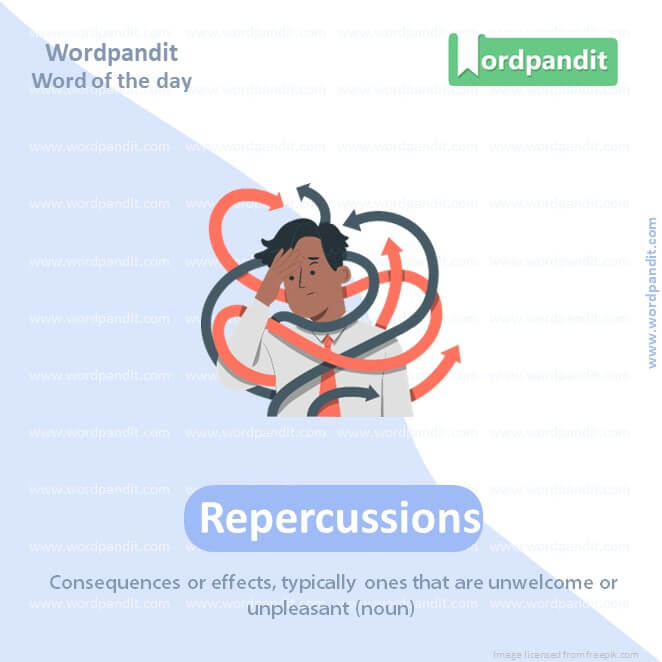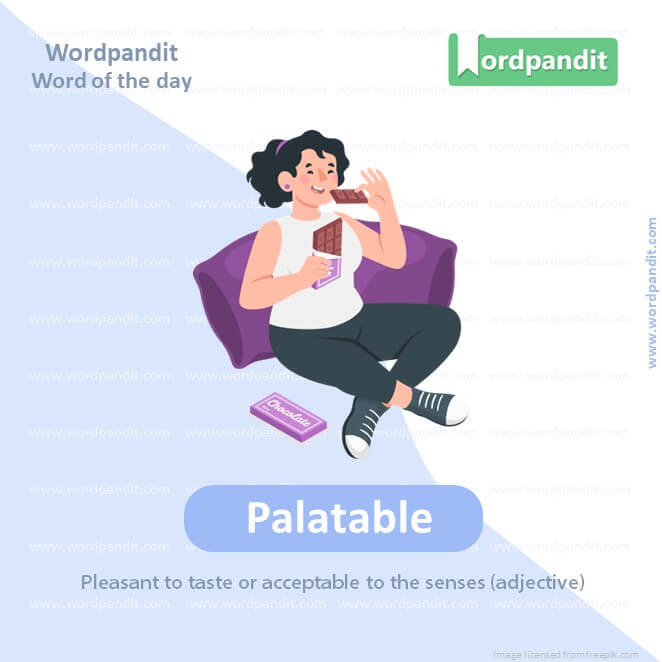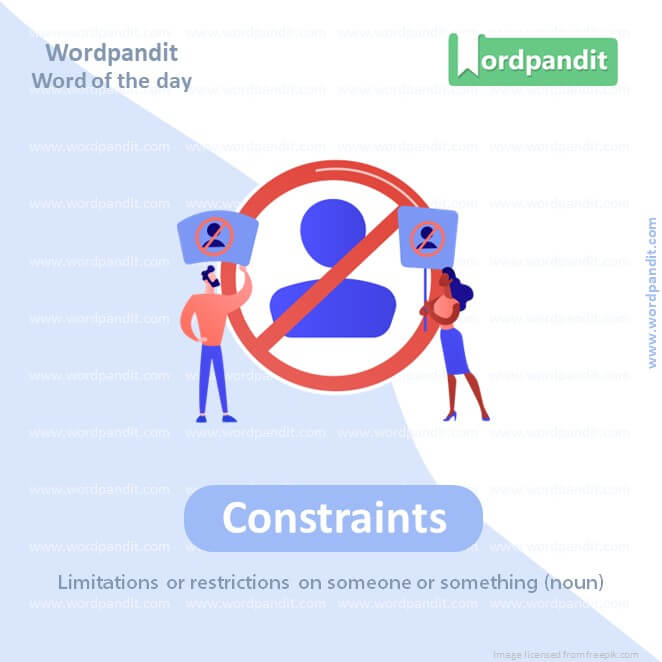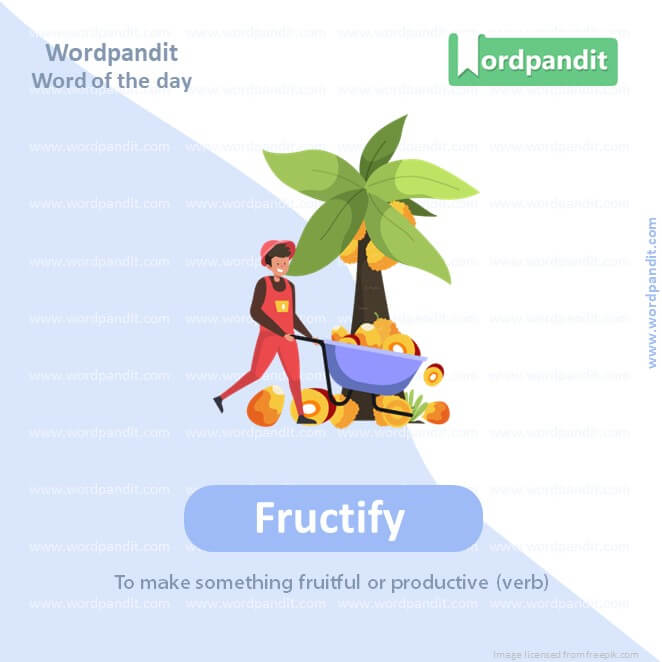Daily Vocabulary Words: List of Daily Used Words in Leading Indian Newspapers
Hi there. Welcome to this special section @ Wordpandit. Our endeavour here is straightforward: highlighting daily vocabulary words that you would come across in leading newspapers in the country. We have included the following newspapers in our selection:
• The Times of India
• The Economic Times
• Hindustan Times
• Mint
• Indian Express
We are putting in extensive work to develop your vocabulary. All you have to do is be regular with this section and check out this post daily. This is your repository of commonly used words; essentially, we are posting a list of daily used words. Hence, this has significant practical application as it teaches you words that are commonly used in leading publications mentioned above.
Visit the website daily to learn words from leading Indian newspapers.

WORD-1: Repercussions
CONTEXT: Raising the MSP for paddy to such a level, an increase of 42 per cent, will have severe repercussions on the economy.
SOURCE: INDIAN EXPRESS
EXPLANATORY PARAGRAPH: Think of when you drop a stone in water, and it makes ripples that spread out. “Repercussions” are like those ripples. They are things that happen
because of something else that happened earlier, like if you don’t do your homework, you might get in trouble later. That trouble is a repercussion.
MEANING: Consequences or effects, typically ones that are unwelcome or unpleasant (noun).
PRONUNCIATION: ree-per-KUH-shuns
SYNONYMS: Consequences, Effects, Outcomes, Results, Backlashes
USAGE EXAMPLE:
1. The decision had serious repercussions for the company.
2. They did not foresee the repercussions of their actions.
3. He worried about the repercussions of failing the test.
4. The environmental policy had positive repercussions.

WORD-2: Palatable
CONTEXT: This will have multiplier effects on the economy, which may not be very palatable to the party in power.
SOURCE: INDIAN EXPRESS
EXPLANATORY PARAGRAPH: “Palatable” is like when you eat something that tastes good. It means something is nice to eat or drink, or sometimes it means an idea or suggestion
that people can accept or agree with.
MEANING: Pleasant to taste or acceptable to the senses (adjective).
PRONUNCIATION: PAL-uh-tuh-bul
SYNONYMS: Tasty, Appetizing, Flavorful, Acceptable, Agreeable
USAGE EXAMPLE:
1. The chef made a very palatable meal.
2. The compromise was palatable to all parties involved.
3. They found a palatable solution to the problem.
4. The medicine was not palatable but necessary.

WORD-3: Constraints
CONTEXT: the hearts of political parties bleed for the poor, let them give income or investment support within budgetary constraints.
SOURCE: INDIAN EXPRESS
EXPLANATORY PARAGRAPH: Imagine being told you can only color inside the lines of a picture. “Constraints” are like those lines – they are rules or limits that stop you from doing whatever you want.
MEANING: Limitations or restrictions on someone or something (noun).
PRONUNCIATION: kuhn-STRAYNTS
SYNONYMS: Restrictions, Limitations, Boundaries, Confinements, Controls
USAGE EXAMPLE:
1. The budget constraints limited their options.
2. Time constraints made it difficult to finish the project.
3. There were several constraints on the use of the park.
4. He worked well despite the constraints.

WORD-4: Fructify
CONTEXT: investments take time to fructify while political parties need quick quid pro quo for the doles in terms of votes.
SOURCE: INDIAN EXPRESS
EXPLANATORY PARAGRAPH: Think of a tiny seed growing into a big fruit-bearing tree. “Fructify” means to make something grow or produce good things, just like the tree grows
fruits from a small seed.
MEANING: To make something fruitful or productive (verb).
PRONUNCIATION: FRUK-tuh-fy
SYNONYMS: Bear fruit, Produce, Yield, Generate, Flourish
USAGE EXAMPLE:
1. Their efforts began to fructify into tangible results.
2. The new strategy will hopefully fructify.
3. He hoped his investments would fructify over time.
4. The garden was designed to fructify abundantly.

WORD-5: Relegated
CONTEXT: They are being relegated to the background in this race to distribute revdis.
SOURCE: INDIAN EXPRESS
EXPLANATORY PARAGRAPH: Imagine playing a game where teams are ranked. If a team moves down to a lower rank, they are “relegated.” It means moving someone or something to a
less important or lower position.
MEANING: Demoted to a lower rank or position (verb).
PRONUNCIATION: REL-eh-gay-tid
SYNONYMS: Demoted, Downgraded, Lowered, Deposed, Displaced
USAGE EXAMPLE:
1. The team was relegated to a lower division.
2. He was relegated to a less important role in the company.
3. The issue was relegated to the background in the discussion.
4. She felt relegated when overlooked for promotion.
WORD-6: Protagonists
CONTEXT: the fact that its middle-aged protagonists, having been estranged from the notion for so long, may not immediately recognise it.
SOURCE: INDIAN EXPRESS
EXPLANATORY PARAGRAPH: In a story, the main character, who is usually the hero or the one the story is mostly about, is called a “protagonist.” This person is very
important in the story, and a lot of things happen to them.
MEANING: The main characters in a story, drama, or other literary work (noun).
PRONUNCIATION: pro-TAG-uh-nists
SYNONYMS: Main characters, Heroes, Lead characters, Central figures, Key players
USAGE EXAMPLE:
1. The protagonists in the novel were very well developed.
2. She admired the strength of the protagonists in the movie.
3. The story revolves around two protagonists.
4. The play features multiple protagonists with intertwined stories.
WORD-7: Monogamous
CONTEXT: Matthew is gay and in a long-term monogamous relationship with another man.
SOURCE: INDIAN EXPRESS
EXPLANATORY PARAGRAPH: Think of animals like swans, who have only one partner their whole life. “Monogamous” means having only one mate or partner. It’s like saying a
person chooses to have only one boyfriend or girlfriend at a time.
MEANING: Having only one mate at a time, or involving marriage to one person at a time (adjective).
PRONUNCIATION: muh-NOG-uh-mus
SYNONYMS: Faithful, Dedicated, Exclusive, Undivided, Committed
USAGE EXAMPLE:
1. Swans are often monogamous, staying with one partner.
2. They decided on a monogamous relationship.
3. The culture promotes monogamous marriages.
4. He was monogamous throughout his life.
WORD-8: Spanning
CONTEXT: the course of his career, spanning just over half a century, the 72-year-old’s range of roles has arguably been wider than that of any other Indian actor of
similar stature.
SOURCE: INDIAN EXPRESS
EXPLANATORY PARAGRAPH: Think of a bridge that stretches from one side of a river to the other. “Spanning” means stretching across or covering a period of time or space,
like the bridge covers the space over the river.
MEANING: Extending across or covering a period of time or area (verb).
PRONUNCIATION: SPAN-ing
SYNONYMS: Covering, Extending, Bridging, Crossing, Stretching
USAGE EXAMPLE:
1. The bridge is spanning the entire river.
2. His career was spanning several decades.
3. The study is spanning multiple countries.
4. The network is spanning the globe.
WORD-9: Villainising
CONTEXT: great compassion and sans any attempt at villainising anyone, looks at what turns it into such an oppressive institution.
SOURCE: INDIAN EXPRESS
EXPLANATORY PARAGRAPH: Imagine someone telling a story and making one person sound really bad or evil, like a storybook villain. “Villainising” is when you talk about someone as if they are a bad person, making them seem like a villain.
MEANING: Portraying someone or something as evil or wicked (verb).
PRONUNCIATION: VIL-uh-nyz-ing
SYNONYMS: Demonizing, Denigrating, Slandering, Defaming, Disparaging
USAGE EXAMPLE:
1. The article was criticized for villainising an innocent person.
2. She felt the media was unfairly villainising her.
3. The campaign involved villainising the opponent.
4. He was against the idea of villainising the other side in the debate.
WORD-10: Denouements
CONTEXT: No nagging saas, no conniving “other” woman or man and no dramatic denouements here — just the ordinary heartbreak of incompatibility and misguided parental intentions, tenderly explored.
SOURCE: INDIAN EXPRESS
EXPLANATORY PARAGRAPH: Think about the end of a story when everything is explained and finished. “Denouements” are like that. They are the parts of a story or event where everything is resolved or finished, and you finally understand everything that happened.
MEANING: The final resolutions or clarifications of a plot in a story or drama (noun).
PRONUNCIATION: day-noo-MAHNZ
SYNONYMS: Conclusions, Resolutions, Endings, Finishes, Culminations
USAGE EXAMPLE:
1. The novel’s denouement left the readers satisfied.
2. The mystery’s denouement was surprising.
3. The play approaches its denouement in the final act.
4. The film’s denouement tied up all the loose ends.
vocabulary pronounce
The art of communication opens up a world of opportunities. However, to glide smoothly through this realm, it is crucial to not only understand the ‘vocabulary pronounce’ but also to exercise precision when using it. The task of acquiring a rich vocabulary and impeccable pronunciation might seem daunting, but there are proficient ways to conquer this hurdle.
While individuals may have a vast vocabulary, it is the ‘vocabulary pronounce’ that truly dictates the overall clarity and comprehension of their messages. Pronunciation is the essence that brings the words, the bricks in the wall of language, to life. Hence, learning proper pronunciation is vital for anyone aiming to achieve excellence in any language.
When delving into ‘vocabulary pronounce’, one should adopt an interactive and immersive approach rather than a theoretical one. Listening and practicing are pillars to gain command over the ‘vocabulary pronounce’. A balance of both can go a long way in improvising and refining one’s language skills. So, it’s advisable to regularly listen to podcasts or watch videos featuring native speakers. These mediums are a treasure trove of right pronunciation, intonation, and pause.
An excellent way to approach learning ‘vocabulary pronounce’ is also to break down complicated or lengthier words into smaller, manageable bits. By doing this, each syllable can be enunciated accurately, promoting correct pronunciation. This technique can significantly reduce the intimidation of difficult words and enhance a learner’s confidence and fluency.
Remember, ‘vocabulary pronounce’ is a lifelong journey and not a destination. Hence, investing time for consistent practicing, learning new words, and understanding their correct pronunciation should be part and parcel of one’s daily routine. Technology, with its various apps and programs, is a helpful ally in this quest.
To conclude, understanding and mastering ‘vocabulary pronounce’ are indeed challenging feats but with the right strategies and diligent practice, they are readily achievable, leading to robust language skills and heightened communication abilities.













